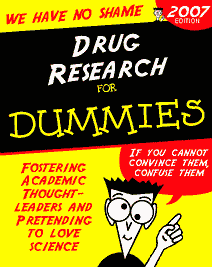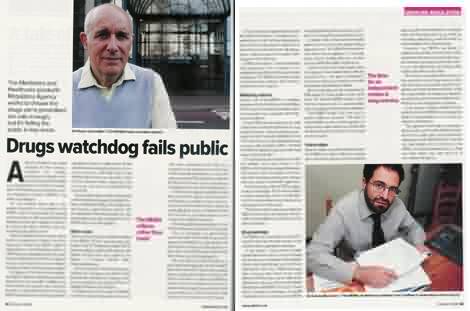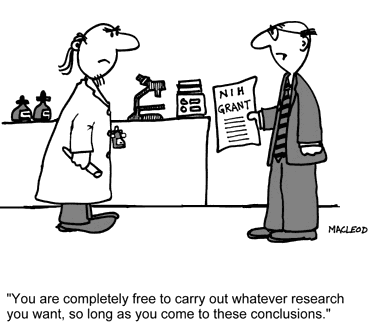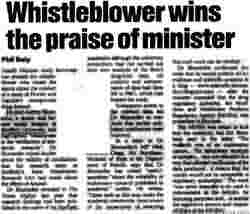Aubrey
 Odette writes: Having had some contact with the world of scientific research, I had just assumed that fraud was standard practice and that no scientist would put good money at risk by publicly admitting that his basic assumptions were wrong when he started planning an experiment. You can't just lose money in blind alleys and you can't be at the mercy of your data. Time and again, I have seen researchers replacing missing data cells with the group average, removing outliers until they get the variance they want, doing linear transformations and even using mind-boggling statistical techniques of their own invention to get a p-value worth publishing.
Odette writes: Having had some contact with the world of scientific research, I had just assumed that fraud was standard practice and that no scientist would put good money at risk by publicly admitting that his basic assumptions were wrong when he started planning an experiment. You can't just lose money in blind alleys and you can't be at the mercy of your data. Time and again, I have seen researchers replacing missing data cells with the group average, removing outliers until they get the variance they want, doing linear transformations and even using mind-boggling statistical techniques of their own invention to get a p-value worth publishing.As one student told me, everybody does it and she has worked hard to get her doctorate. She had no control over the experiment or the technicians doing the analysis and there is no degree for work done, just one for results obtained. That science is a corrupt field populated by frauds, psychopaths, hucksters and hustlers is not news. It just surprises me when someone comes out of the woodwork to complain because I wonder how a person could get their degrees and spend years surrounded by such colleagues without noticing something amiss before now. As another student told me, "Why can't you just play the game?"
And why not? I know someone who bucked the system like you and as a result, the researcher he was complaining about colluded with the university rector to falsify results in order to hide the original delinquent data. He was dismissed from his doctoral studies and threatened with a libel suit. Can't blame everyone else for keeping quiet.
My attitude towards research now is you find what you're being paid to find and if ten years from now someone finds something different, no one will take away your diplomas, awards, funding etc. retroactively. Besides, theories go in and out of fashion and even if you take the pains to do ethical research, it doesn't mean that anyone will even consider it relevant by then.
Furthermore, the moral argument that human lives are at risk is getting shakier every day. This is not a position based on reason, but on an ancient moral code involving notions of sacredness and higher power that have been discredited by liberalism for some time now. Inasmuch as liberalism seeks to subsume all aspects of human life to the power of reason, it is to be expected that those who operate from this framework desire to exercise the power they devoted their mental abilities to obtain. The ultimate power, that formerly reserved for the gods, is the power over life and death. Thus, having stripped the gods of their moral authority via reason, why would one hesitate to appropriate their ultimate power over human life as one's own because a few faceless individuals are standing in the way of boundless good fortune, prestige and even more power. This is the final power that religion refused us and that rationalism can confer, that it is not rational to let a few lives matter more than all that can be obtained by possibly putting them at risk. And that's why we have unsafe products, bad meds, pollution and a host of other ills that actuarial bean counters allow to be foisted on the public because in their estimation, a few faceless lives that could be lost are not worth the cost of doing things "right".
It also helps to remember that "In the long run, we'll all be dead." It's not like there's someone waiting on the other side to hold you to account because you colluded with a pharmaceutical firm in putting out a bad product that harmed someone. These companies have enough money to keep people tied up in court for a long time, especially if they are poor or indigent, which is why product testing in the developing world is such a good idea. Thus, you could probably escape the negative moral consequences of your rational course of self-interest completely, whereas your irrational devotion to a moral position that would keep poor people picking through garbage in Brazzaville while you have an obscure career with little fame and even less money seems to no one's advantage.
If you think the game is fun now, wait 'til all those Chinese researchers who were trained in the west start churning out publications back home with a trillion-dollar economy to back them up. They can drown us in normal curves and powerpoint presentations and we'll never be able to separate the wheat from the chaff.
As it is, why would we believe any white-coated pharmaceutical/government research apparatchik about anything? These people have secured their position over the rest of us for a hundred years by touting their greater capacity for reason. Problem is, I have lost faith in the power of the white coat and the fancy diploma to know better than me. I just expect them to be more arrogant about it, that's all. So, call me superstitious, call me irrational if you like, but my years in data analysis have taught me that I can demonstrate that astrology works, that homeopathic medecine is a panacea, that aliens communicate with us or any else I want, as long as I am financed by deep pockets who find it in their interest to popularize these beliefs. By the way, you might want to keep all this in mind when you see the bible beaters attacking science. The way I see it, scientists brought it on themselves. Now, if they could only figure out how to get research grants from these people, think what amazing new "facts" they could discover.
Odette Lussier
Earlier|Later|Main Page







 "an expert watchdog has announced that it is to disband, claiming it has been used as a fig leaf for the Government’s failure to provide volunteers with independent advice or support. The watchdog CERES (consumers for ethics in research) launched itself as “the voice of the guinea-pig” in 1989. For the past three years this group of academics and health service experts has lobbied for funding to run helplines for drug-test volunteers. But it is to disband on December 31, claiming that the Government’s clinical ethics committee has been advising drug-trial researchers that simply showing volunteers a leaflet from CERES will satisfy the EU requirement. CERES says this has been done “without our permission or recognition"
"an expert watchdog has announced that it is to disband, claiming it has been used as a fig leaf for the Government’s failure to provide volunteers with independent advice or support. The watchdog CERES (consumers for ethics in research) launched itself as “the voice of the guinea-pig” in 1989. For the past three years this group of academics and health service experts has lobbied for funding to run helplines for drug-test volunteers. But it is to disband on December 31, claiming that the Government’s clinical ethics committee has been advising drug-trial researchers that simply showing volunteers a leaflet from CERES will satisfy the EU requirement. CERES says this has been done “without our permission or recognition"


